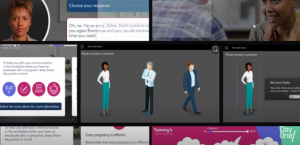Forward-thinking business leaders now see corporate compliance training as more than just a box-ticking exercise. It’s a critical component of risk management, employee engagement, and organisational integrity in 2025.

Modern workplaces must address the unique needs of diverse working arrangements, from in-house teams to remote, field-based, and hybrid workers, as well as extended enterprise stakeholders such as suppliers, contractors, distributors and strategic partners.
Digital learning has emerged as a vital tool to ensure corporate compliance training remains effective, accessible, and scalable.
The Changing Landscape of Corporate Compliance
With an increase in globalisation, remote work, and technological advancements, organisations face new regulatory challenges. For UK and EU companies, compliance requirements in 2025 are shaped by legislation such as:
- The UK Corporate Governance Code 2024: Published by the Financial Reporting Council (FRC) in January 2024, the updated legislation introduces several key changes designed to increase transparency and accountability, while minimising burdens on businesses.
- The EU Whistleblowing Directive: Mandates organisations to provide secure channels for reporting misconduct and to train employees on whistleblower rights.
- UK Data Protection Act 2018 (aligned with GDPR): Requires organisations to ensure data privacy and security awareness among all employees.
- Health and Safety at Work Act 1974: Continues to be a cornerstone of workplace safety, now expanded to include guidance for remote and hybrid workers.
- Modern Slavery Act 2015: Obligates organisations to train employees on recognising and addressing modern slavery risks in their supply chains.
- Equality Act 2010: Demands awareness training to prevent discrimination and foster inclusive workplaces.
Furthermore, the UK Government is showing that it’s taking Russia sanctions seriously. In March 2025, The Office of Financial Sanctions Implementation (OFSI) published news that it has imposed a monetary penalty of £465,000 against the Moscow subsidiary of a major UK and international law firm for breaches of financial sanctions imposed on Russia following its illegal invasion of Ukraine.
This makes clear the importance of sanctions training for companies trading globally to ensure that they stay compliant.
Addressing the Needs of Diverse Workforces
1. In-House Employees
Traditional in-house teams often benefit from face-to-face interaction, but modern compliance training should integrate digital learning to enhance engagement and retention. Key strategies include:
- Microlearning modules: Delivering compliance content in bite-sized chunks to avoid information overload.
- Gamification: Using quizzes and interactive scenarios to make learning engaging.
- Personalised learning pathways: Customising content to match job roles and responsibilities.
By blending in-person workshops with digital resources, organisations can provide a consistent and comprehensive training experience.
2. Remote Workers
Remote working is now a permanent fixture for many organisations, necessitating a shift to fully digital compliance training. Effective approaches include:
- Cloud-based learning platforms: Accessible anytime, anywhere, ensuring flexibility for remote teams.
- Video-based scenarios: Demonstrating compliance practices in relatable, real-world contexts.
- Virtual classrooms: Enabling interactive sessions to discuss complex topics, such as ethical dilemmas or new legislation.
Remote workers also need training tailored to their unique challenges, such as cybersecurity awareness to mitigate risks associated with remote access.
3. Field-Based Employees
Field-based workers, such as sales representatives or delivery personnel, face compliance risks tied to their mobile work environment. Training for this group must prioritise:
- Mobile-first learning solutions: Optimised for smartphones and tablets, ensuring accessibility on the go.
- Just-in-time training: Providing immediate, role-specific guidance through mobile apps or quick reference guides.
- Scenario-based learning: Offering realistic simulations to practise handling compliance issues in dynamic environments.
Digital learning tools are essential for delivering consistent, scalable training to dispersed field teams.
4. Hybrid Workers
Hybrid workers split their time between office and home, requiring a blend of in-person and digital training methods. To meet their needs, organisations should:
- Leverage learning management systems (LMS): Ensuring seamless access to training materials across devices.
- Use blended learning approaches: Combining online modules with face-to-face workshops for critical compliance topics.
- Track engagement and completion rates: Ensuring no gaps in compliance knowledge regardless of location.
Hybrid workforces benefit from the flexibility of digital learning while still valuing occasional in-person sessions for deeper engagement.
5. Extended Enterprise
Compliance training should extend beyond direct employees to contractors, suppliers, and other third-party stakeholders. Ensuring consistency across the extended enterprise requires:
- Scalable eLearning platforms: Providing universal access to compliance modules.
- Customised content: Addressing specific risks and regulations relevant to third-party roles.
- Regular updates and assessments: Keeping stakeholders informed of changes in legislation and best practices.
Digital learning ensures that external partners align with organisational compliance standards, minimising risks across the value chain.
The Role of Digital Learning in Compliance Training
Digital learning has transformed the way organisations deliver compliance training. Its benefits include:
- Cost efficiency: Reducing the expense of in-person training by leveraging scalable online solutions.
- Customisation: Allowing organisations to tailor training content to meet specific regulatory and organisational needs.
- Data-driven insights: Tracking participation, progress, and knowledge retention through LMS analytics.
- Engagement: Enhancing learner interaction through multimedia, gamification, and scenario-based learning.
Trends in Digital Compliance Training
- Training gamification: Bringing game-playing principles into the learning process, such as point scoring and competition, to enhance engagement and motivation.
See how we brought scenarios and gamification into soft-skills training for Mercedes-Benz.
- Artificial intelligence (AI): Personalising learning experiences and identifying knowledge gaps.
- Virtual reality (VR) simulations: Immersing learners in realistic compliance scenarios for deeper understanding.
- Microlearning and micro-certifications: Bite-size learning content and quick, credible recognition of compliance expertise.
- Custom elearning content: Increasing learner engagement and reducing time to competency with content made bespoke to specific roles and working environments.
See examples of our bespoke elearning development for the likes of Amazon, NHS, Linde, Lloyds Bank and many more UK, European and global brands.
Summary
Compliance training for the modern workplace must adapt to the diverse needs of in-house, remote, field-based, hybrid, and extended enterprise stakeholders. By integrating digital learning into their corporate compliance strategies, organisations can create engaging, flexible, and effective training programmes that meet the demands of a complex regulatory environment in 2025.
Embracing technology not only ensures compliance but also builds a culture of accountability, trust, and continuous learning – key ingredients for long-term organisational success.
Can we help you to bring corporate compliance training to life with interactive digital learning?
Contact us here at Day One for an informal chat about your needs.


















